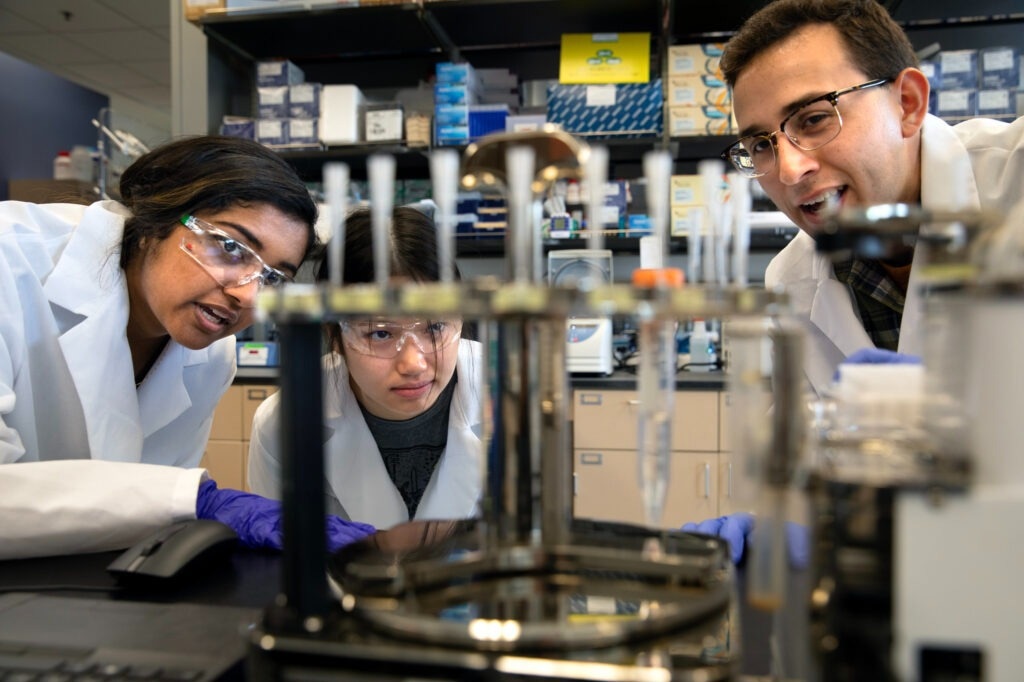Reviewed by Danielle Ellis, B.Sc.May 5 2023
An artificial intelligence system facilitates robots to perform independent scientific experiments—as many as 10,000/day—possibly taking a big step ahead in the speed of discovery in fields from medicine to environmental science to agriculture.

Paul Jensen, Assistant Professor at University of Michigan Biomedical Engineering and his graduate students have created an artificial intelligence agent that uses game-playing robots to answer scientific questions. BacterAI can assign autonomous scientific experiments for robots that eventually lead to answers that would normally take humans years to answer. Their Deep Phenotyping system has completed 931,038 automated experiments since January 2020. Image Credit: Marcin Szczepanski/Lead Multimedia Storyteller, Michigan Engineering
Nature Microbiology reported the study on May 4th, 2023. Now, the research group was headed by a professor at the University of Michigan.
BacterAI, the artificial intelligence platform, mapped the metabolism of two microbes linked to oral health—with no baseline data to begin with. Some combinations of the 20 amino acids are consumed by bacteria, which are required to support life; however, every species needs certain nutrients to nurture. The U-M team wished to gain knowledge on what amino acids are required by the useful microbes in human mouths so they can stimulate their growth.
“We know almost nothing about most of the bacteria that influence our health. Understanding how bacteria grow is the first step toward reengineering our microbiome,” said Paul Jensen, U-M assistant professor of biomedical engineering who was at the University of Illinois when the project began.
However, determining the combination of amino acids that are liked by bacteria is complicated. Those 20 amino acids produce over a million likely combinations, just depending on whether all amino acids are existing or not. Still, BacterAI could discover the amino acid necessities for the growth of Streptococcus sanguinis and Streptococcus gordonii.
To determine the correct formula for every species, BacterAI assessed hundreds of combinations of amino acids per day, improving its attention and altering combinations every morning depending on the findings of the previous day. In just nine days, it was making precise forecasts 90% of the time.
Contrary to traditional methods that consume labeled data sets into a machine-learning model, BacterAI produces its own data set via a chain of experiments. By examining the findings of earlier trials, it provides predictions of what new experiments might give the majority of information. Consequently, it found a majority of the rules with fewer than 4,000 experiments for feeding bacteria.
When a child learns to walk, they don’t just watch adults walk and then say ‘Ok, I got it,’ stand up, and start walking. They fumble around and do some trial and error first. We wanted our AI agent to take steps and fall down, to come up with its own ideas and make mistakes. Every day, it gets a little better, a little smarter.”
Paul Jensen, Assistant Professor, Biomedical Engineering, University of Illinois
Little to no research has been performed on nearly 90% of bacteria, and the quantity of resources and time required to study even fundamental scientific data about them with traditional methods is intimidating. These discoveries can be expedited with the help of automated experimentation. In a single day, the team conducted a maximum of 10,000 experiments.
However, the applications are not limited to microbiology. Scientists from any stream of knowledge can set up questions as puzzles for AI to resolve via this type of trial and error.
With the recent explosion of mainstream AI over the last several months, many people are uncertain about what it will bring in the future, both positive and negative. But to me, it’s very clear that focused applications of AI like our project will accelerate everyday research.”
Adam Dama, Study Lead Author and Former Engineer, Jensen Lab
Source:
Journal reference:
Dama, A. C., et al. (2023). BacterAI maps microbial metabolism without prior knowledge. Nature Microbiology. doi.org/10.1038/s41564-023-01376-0